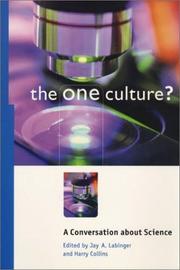| Listing 1 - 2 of 2 |
Sort by
|

ISBN: 1282738445 9786612738449 0226467244 9780226467245 9780226467221 0226467228 0226467236 0226467228 9780226467221 Year: 2001 Publisher: Chicago, Ill. University of Chicago Press
Abstract | Keywords | Export | Availability | Bookmark
 Loading...
Loading...Choose an application
- Reference Manager
- EndNote
- RefWorks (Direct export to RefWorks)
So far the "Science Wars" have generated far more heat than light. Combatants from one or the other of what C. P. Snow famously called "the two cultures" (science versus the arts and humanities) have launched bitter attacks but have seldom engaged in constructive dialogue about the central issues. In The One Culture?, Jay A. Labinger and Harry Collins have gathered together some of the world's foremost scientists and sociologists of science to exchange opinions and ideas rather than insults. The contributors find surprising areas of broad agreement in a genuine conversation about science, its legitimacy and authority as a means of understanding the world, and whether science studies undermines the practice and findings of science and scientists. The One Culture? is organized into three parts. The first consists of position papers written by scientists and sociologists of science, which were distributed to all the participants. The second presents commentaries on these papers, drawing out and discussing their central themes and arguments. In the third section, participants respond to these critiques, offering defenses, clarifications, and modifications of their positions. Who can legitimately speak about science? What is the proper role of scientific knowledge? How should scientists interact with the rest of society in decision making? Because science occupies such a central position in the world today, such questions are vitally important. Although there are no simple solutions, The One Culture? does show the reader exactly what is at stake in the Science Wars, and provides a valuable framework for how to go about seeking the answers we so urgently need. Contributors include: Constance K. Barsky, Jean Bricmont, Harry Collins, Peter Dear, Jane Gregory, Jay A. Labinger, Michael Lynch, N. David Mermin, Steve Miller, Trevor Pinch, Peter R. Saulson, Steven Shapin, Alan Sokal, Steven Weinberg, Kenneth G. Wilson
Science --- Science and state. --- Normal science --- Philosophy of science --- Science policy --- State and science --- State, The --- Science and society --- Sociology of science --- Social aspects. --- Philosophy. --- Government policy --- Sociology of knowledge --- science, legitimacy, scientific knowledge, polanyi, turing, wittgenstein, sociology, public opinion, policy, government, popular culture, physics, history, epistemography, research questions, social construction, antiscience, relativism, methodology, contingency, overdetermination, experience, authority, historiography, philosophy, academia, nonfiction.
Book

ISBN: 3110481111 3110479575 Year: 2021 Publisher: Berlin ; Boston : De Gruyter,
Abstract | Keywords | Export | Availability | Bookmark
 Loading...
Loading...Choose an application
- Reference Manager
- EndNote
- RefWorks (Direct export to RefWorks)
Physics and Literature is a unique collaboration between physicists, literary scholars, and philosophers, the first collection of essays to examine together how science and literature, beneath their practical differences, share core dimensions - forms of questioning, thinking, discovering and communicating insights.This book advances an in-depth exploration of relations between physics and literature from both perspectives. It turns around the tendency to discuss relations between literature and science in one-sided and polarizing ways. The collection is the result of the inaugural conference of ELINAS, the Erlangen Center for Literature and Natural Science, an initiative dedicated to building bridges between literary and scientific research. ELINAS revitalizes discussion of science-literature interconnections with new topics, ideas and angles, by organizing genuine dialogue among participants across disciplinary lines.The essays explore how scientific thought and practices are conditioned by narrative and genre, fiction, models and metaphors, and how science in turn feeds into the meaning-making of literary and philosophical texts. These interdisciplinary encounters enrich reflections on epistemology, cognition and aesthetics.
| Listing 1 - 2 of 2 |
Sort by
|

 Search
Search Feedback
Feedback About UniCat
About UniCat  Help
Help News
News